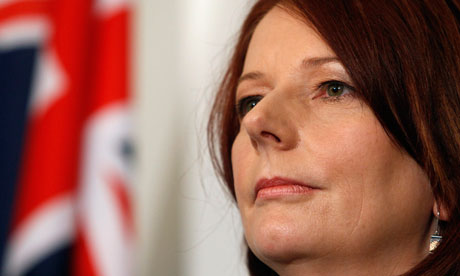She makes clear that there is no going back:
The important thing to know is that from 1 July 2012, carbon will be priced in the Australian economy.It is here where I think that Gillard has made a bad bet. Carbon pricing is supposed to create jobs by making fossil fuels appreciably more expensive, thereby creating a market signal that disfavors carbon-intensive industry and stimulates less carbon-intensive economic activity. The economic parts of theory seem sound enough.
The journey of transformation will begin.
Friends, I chose action over inaction because of this simple truth:
If Australia does not adopt a carbon price in 2011, we probably never will.
This is the year of decision.
Action versus inaction.
Acceptance versus denial.
Setting Australia on the path to a high skill, low carbon future.
Or leaving our economy to decay into a rusting industrial museum.
That is the choice we face.
Action will protect jobs.
However, it is the political realities that the theory does not account for. Australia's economy is very carbon intensive (PDF). Thus, if carbon pricing were to work exactly as the Prime Minister describes, it will necessary lead to a great deal of economic dislocation and change -- Consider that to meet the 5% emissions reduction target (from 2000 levels), without relying on offsets or other tricks, implies that Australia's economy would need to become as carbon efficient as Japan's by the end of this decade. How such a profoundly disruptive transitional period would be managed is the one issue that advocates of a high carbon price have never really dealt with -- the market's invisible hand will take care of it I guess.
Gillard, also skips over that part:
We cannot afford to be stranded with an outdated high-emissions economy.How does one become "reskilled"? Without an explanation, many people will translate "reskilled" to mean "unemployed". The oft-stated idea that the proceeds of a carbon tax will be used to compensate those who fact higher costs does not address the issue of dislocation in the economy. There is a element of "magical thinking" in the idea that transforming a national economy starts with a simple decision:
We can’t freeze our economy in time, any more than we could lock ourselves behind tariff walls while the world changed outside.
I don’t want us to wake up in ten years time lumbered with a high carbon economy when the rest of the world has moved on and then scramble to catch up.
Our nation is well equipped to make the transition.
We have an abundance of natural resources like wind, natural gas, solar and geothermal.
For example, the highest average solar radiation per square metre of any continent in the world.
We have an agile, innovative business sector tempered by three decades of exposure to global competition.
We have a talented workforce ready to embrace the jobs of tomorrow. . .
Inaction will also cost jobs because emission-intensive economies will become uncompetitive in a low carbon world.
In the quest for comparative advantage, investment will flow towards those countries that can offer more output for fewer emissions.
Inaction will cost jobs.
Action will support jobs.
Friends, action on climate change means creating new jobs for the future.
It means saving and transforming existing jobs.
It means re-skilling workers for the future.
We will see new job opportunities in clean energy generation.
Electric and hybrid cars.
Manufacturing clean energy equipment.
Energy efficient construction and retro-fitting existing buildings.
Carbon capture and storage.
Today’s workers will find themselves in different industries and different settings.
Welders and steel workers will build and maintain large-scale solar power plants.
Plumbers and electricians will be reskilled to install solar hot water systems and solar panels.
. . . clean energy will open up opportunities we are only just beginning to imagine.There are only two realistic outcomes here. One is that the carbon tax proposal is scrapped. With this speech it seems highly unlikely that Gillard will be the one doing any scrapping. So it would probably be via an election or a change in leadership, such as if Kevin Rudd becomes captain of the Brisbane Broncos. The second possible outcome is that the carbon pricing is watered down so far that its enactment allows Labor to claim success while limiting any actual impact from the tax on the economy. Of course, that would undercut its stated purpose -- to transform the economy.
Those opportunities begin with that simple but momentous decision: Putting a price on carbon.
Friends, a price on carbon is the cheapest way to drive investment and jobs.
Either way, I do not see a good outcome here for Gillard or for carbon pricing. A better strategy is the one proposed in The Climate Fix -- start with a very low carbon tax, one that is politically acceptable, and use the proceeds to invest in innovation. The carbon price would rise over time as the fruits of innovation make it politically acceptable to raise that price. I expect that Australia will soon provide (yet aonpther) lesson in how not to try to put a price on carbon.
